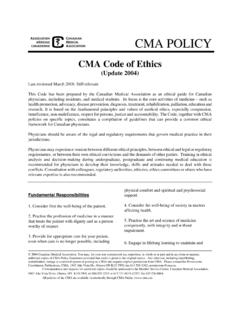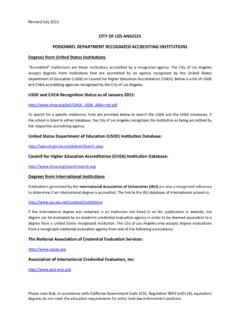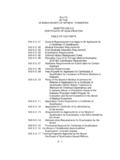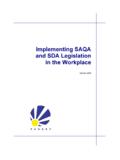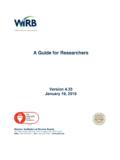Transcription of CMA POLICY
1 CMA POLICY . GUIDELINES FOR PHYSICIANS IN. INTERACTIONS WITH INDUSTRY. The history of health care delivery in Canada has included interaction between physicians and the pharmaceutical and health supply industries; this interaction has extended to research as well as to education. Physicians understand that they have a responsibility to ensure that their participation in such collaborative efforts is in keeping with their primary obligation to their patients and duties to society, and to avoid situations of conflict of interest where possible and appropriately manage these situations when necessary. They understand as well the need for the profession to lead by example by promoting physician-developed guidelines. The following guidelines have been developed by the CMA to serve as a resource tool for physicians in helping them to determine what type of relationship with industry is appropriate.
2 They are not intended to prohibit or dissuade appropriate interactions of this type, which have the potential to benefit both patients and physicians. Although directed primarily to individual physicians, including residents, and medical students, the guidelines also apply to relationships between industry and medical organizations. General Principles 4. Physicians should resolve any conflict of interest between themselves and their patients 1. The primary objective of professional resulting from interactions with industry in interactions between physicians and industry favour of their patients. In particular, they must should be the advancement of the health of avoid any self-interest in their prescribing and Canadians. referral practices. 2. Relationships between physicians and 5. Except for physicians who are employees of industry are guided by the CMA's Code of industry, in relations with industry the Ethics and by this document.
3 Physician should always maintain professional 3. The practising physician's primary obligation autonomy and independence. All physicians is to the patient. Relationships with industry are should remain committed to scientific inappropriate if they negatively affect the methodology. fiduciary nature of the patient physician 6. Those physicians with ties to industry have relationship. an obligation to disclose those ties in any 2007 Canadian Medical Association. You may, for your non-commercial use, reproduce, in whole or in part and in any form or manner, unlimited copies of CMA POLICY Statements provided that credit is given to the original source. Any other use, including republishing, redistribution, storage in a retrieval system or posting on a Web site requires explicit permission from CMA. Please contact the Permissions Coordinator, Publications, CMA, 1867 Alta Vista Dr.
4 , Ottawa ON K1G 3Y6; fax 613 565-2382; Correspondence and requests for additional copies should be addressed to the Member Service Centre, Canadian Medical Association, 1867 Alta Vista Drive, Ottawa, ON K1G 3Y6; tel 888 855-2555 or 613 731-8610 x2307; fax 613 236-8864. All policies of the CMA are available electronically through CMA Online ( ). PD08-01. situation where they could reasonably be participating in research studies should not perceived as having the potential to influence constitute enticement. It may cover reasonable their judgment. time and expenses and should be approved by the relevant research ethics board. Research Industry-Sponsored Research subjects must be informed if their physician will receive a fee for their participation and by 7. A prerequisite for physician participation in whom the fee will be paid.
5 All research activities is that these activities are 13. Finder's fees, whereby the sole activity ethically defensible, socially responsible and performed by the physician is to submit the scientifically valid. The physician's primary names of potential research subjects, should not responsibility is the well-being of the patient. be paid. Submission of patient information 8. The participation of physicians in industry without their consent would be a breach of sponsored research activities must always be confidentiality. Physicians who meet with preceded by formal approval of the project by patients, discuss the study and obtain informed an appropriate ethics review body. Such consent for submission of patient information research must be conducted according to the may be remunerated for this activity. appropriate current standards and procedures.
6 14. Incremental costs (additional costs that are 9. Patient enrolment and participation in directly related to the research study) must not research studies must occur only with the full, be paid by health care institutions or provincial informed, competent and voluntary consent of or other insurance agencies regardless of the patient or his or her proxy, unless the whether these costs involve diagnostic research ethics board authorizes an exemption procedures or patient services. Instead, they to the requirement for consent. In particular, must be assumed by the industry sponsor or its the enrolling physician must inform the agent. potential research subject, or proxy, about the 15. When submitting articles to medical purpose of the study, its source of funding, the journals, physicians must state any relationship nature and relative probability of harms and they have to companies providing funding for benefits, and the nature of the physician's the studies or that make the products that are participation and must advise prospective the subject of the study whether or not the subjects that they have the right to decline to journals require such disclosure.
7 Funding participate or to withdraw from the study at any sources for the study should also be disclosed. time, without prejudice to their ongoing care. 16. Physicians should only be included as an 10. The physician who enrolls a patient in a author of a published article reporting the research study has an obligation to ensure the results of an industry sponsored trial if they protection of the patient's privacy, in have contributed substantively to the study or accordance with the provisions of applicable the composition of the article. national or provincial legislation and CMA's 17. Physicians should not enter into agreements Health Information Privacy Code. If this that limit their right to publish or disclose protection cannot be guaranteed, the physician results of the study or report adverse events must disclose this as part of the informed which occur during the course of the study.
8 Consent process. Reasonable limitations which do not endanger 11. Practising physicians should not participate patient health or safety may be permissible. in clinical trials unless the study will be registered prior to its commencement in a Industry-Sponsored Surveillance Studies publicly accessible research registry. 12. Because of the potential to influence 18. Physicians should participate only in post- judgment, remuneration to physicians for marketing surveillance studies that are 2. scientifically appropriate for drugs or devices to manage conflicts once they are disclosed. relevant to their area of practice and where the 25. The ultimate decision on funding study may contribute substantially to arrangements for CME/CPD activities is the knowledge about the drug or device. Studies responsibility of the physician-organizers.
9 That are clearly intended for marketing or other Although the CME/CPD publicity and written purposes should be avoided. materials may acknowledge the financial or 19. Such studies must be reviewed and approved other aid received, they must not identify the by an appropriate research ethics board. The products of the company(ies) that fund the National Council on Ethics in Human Research activities. is an additional source of advice. 26. All funds from a commercial source should 20. The physician still has an obligation to be in the form of an unrestricted educational report adverse events to the appropriate body or grant payable to the institution or organization authority while participating in such a study. sponsoring the CME/CPD activity. 27. Industry representatives should not be Continuing Medical Education / members of CME content planning Continuing Professional Development committees.
10 They may be involved in providing (CME/CPD) logistical support. 28. Generic names should be used in addition to 21. This section of the Guidelines is understood trade names in the course of CME/CPD. to address primarily medical education activities. initiatives designed for practicing physicians. 29. Physicians should not engage in peer selling. However, the same principles will also apply for Peer selling occurs when a pharmaceutical or educational events (such as noon-hour rounds medical device manufacturer or service provider and journal clubs) which are held as part of engages a physician to conduct a seminar or medical or residency training. similar event that focuses on its own products 22. The primary purpose of CME/CPD and is designed to enhance the sale of those activities is to address the educational needs of products.
